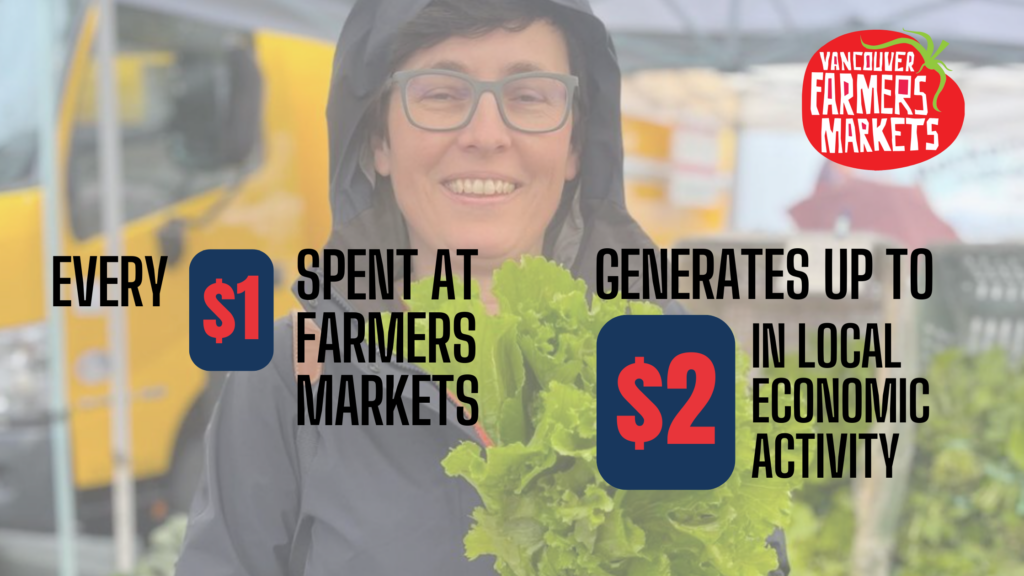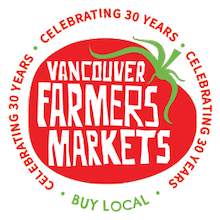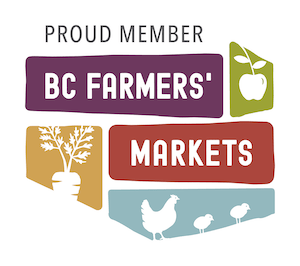The Multiplier Effect: A Tale of Two Heads of Lettuce

Picture two heads of lettuce—one grown locally in BC and another trucked in from California. Both look fresh on the shelf, but their economic impact couldn’t be more different.
The BC-grown lettuce fuels the local economy, and when this BC-grown lettuce is sold and bought at the local farmers markets, it is the farmer who directly sells to the shoppers. The dollar value of this lettuce circulates within the local economy, strengthening local businesses, creating jobs, and sustaining communities.
The imported lettuce, however, follows a different path—profits go to wholesalers and importers, with much of the money leaving the local economy. And, this is the multiplier effect of buying local!
Research shows that every $1 spent on local food generates up to $2 in local economic activity.
Economic Resilience Through Local Food
Local food systems are not just about food—they are about economic stability. Investing in local food systems strengthens economic stability and supports small businesses. Farmers markets serve as vital incubators, providing entrepreneurs with an affordable way to test products, build brand recognition, and connect with customers. When consumers choose to buy directly from local farmers and food producers, more money stays within the community, helping to create jobs and sustain regional economies. However, farmers often receive only a small fraction of what consumers spend on food, as much of it goes to processing, distribution, and retail. Shifting more food spending to local sources like farmers markets ensures that farmers earn a fairer share while fostering a resilient and self-sustaining local food economy.
The Policy Gap: Why We Need Government Support
Despite the clear economic and social benefits, farmers markets still face unnecessary barriers due to outdated policies.
- Our city needs permanent market spaces – our community wants farmers markets. Temporary space allocation forces farmers markets to operate seasonally or in temporary locations. A shift towards permanent infrastructure for year-round markets would create stability for vendors and shoppers alike.
- Current zoning and permit regulations often fail to recognize markets as business incubators and community food hubs. Just this year, VFM expects to create over 13,000 opportunities for small businesses at farmers markets; however, without municipal and provincial government support, scalability in this area is not possible. There is clearly a need to update policies and allocate financial support to acknowledge the critical role of farmers markets in economic development.
- Corporate partnerships have the potential to bridge funding gaps, allowing more low-income families to access fresh food through subsidy programs like Fresh to Families.
The Environmental Case for Local Food
Beyond economic benefits, local food is also better for the planet:
- Food at farmers markets travels an average of 50 km, compared to the 2,400 km that most grocery stores produce. This means fewer emissions and a lower carbon footprint.
- Small-scale farmers are more likely to use regenerative agriculture practices, which support soil health and biodiversity.
- Shorter supply chains mean less food waste, as products don’t sit in transit or warehouses before reaching consumers.
How You Can Take Action
Supporting local food systems isn’t just about where you shop—it’s about advocating for policies that recognize their value.
✅ Shop at your local farmers market—every dollar makes a difference.
✅ Advocate for provincial and municipal policies that promote year-round markets and infrastructure investment.
✅ Encourage corporate sponsorships to help fund programs like Fresh to Families.
✅ Spread the word—share this post and educate others about the importance of local food.
At Vancouver Farmers Markets, we want to make #buylocal a long-term strategy, not just a seasonal trend. Join us in shaping a food system that is fair, sustainable, and community-driven.
How do you think we can better support local food systems? Drop your thoughts in the comments below!




